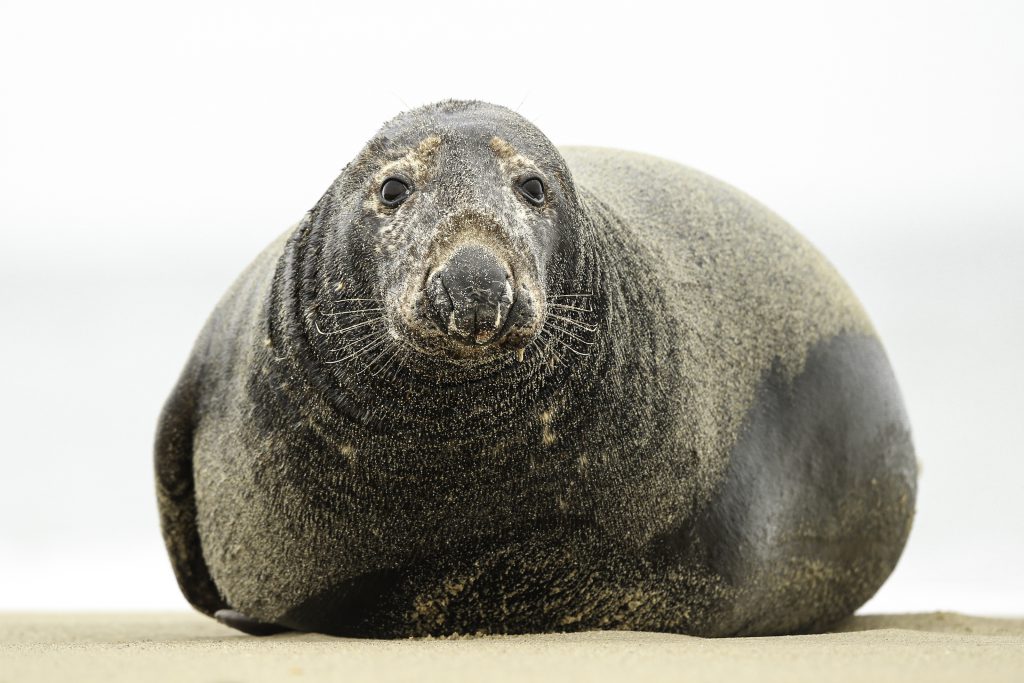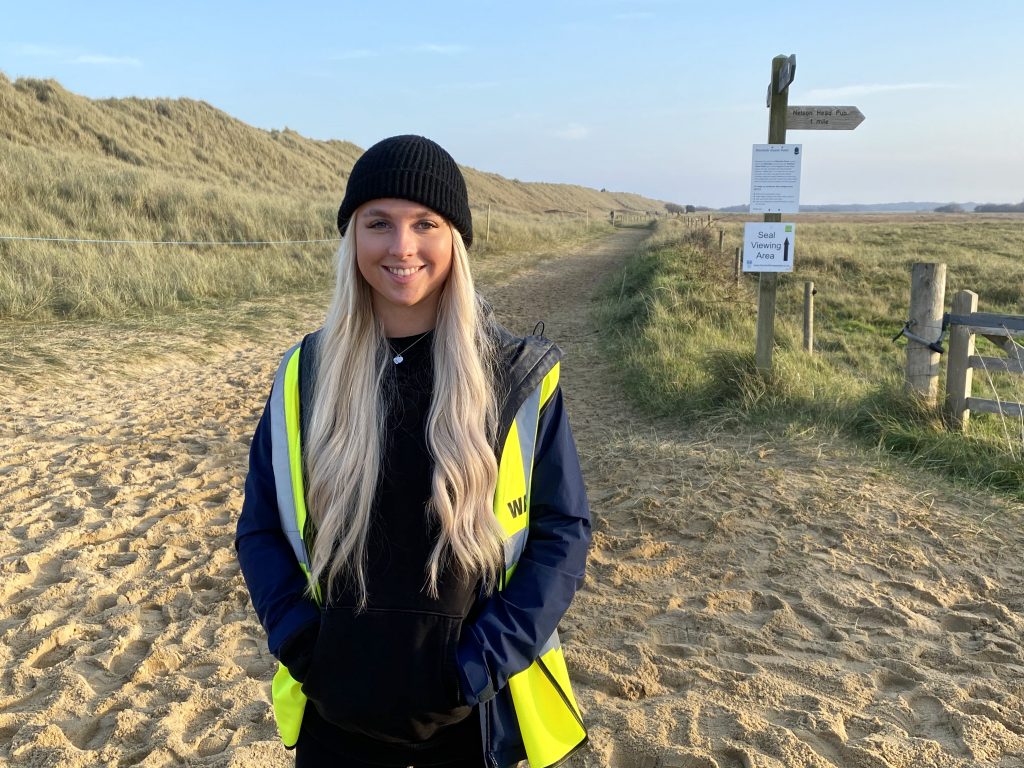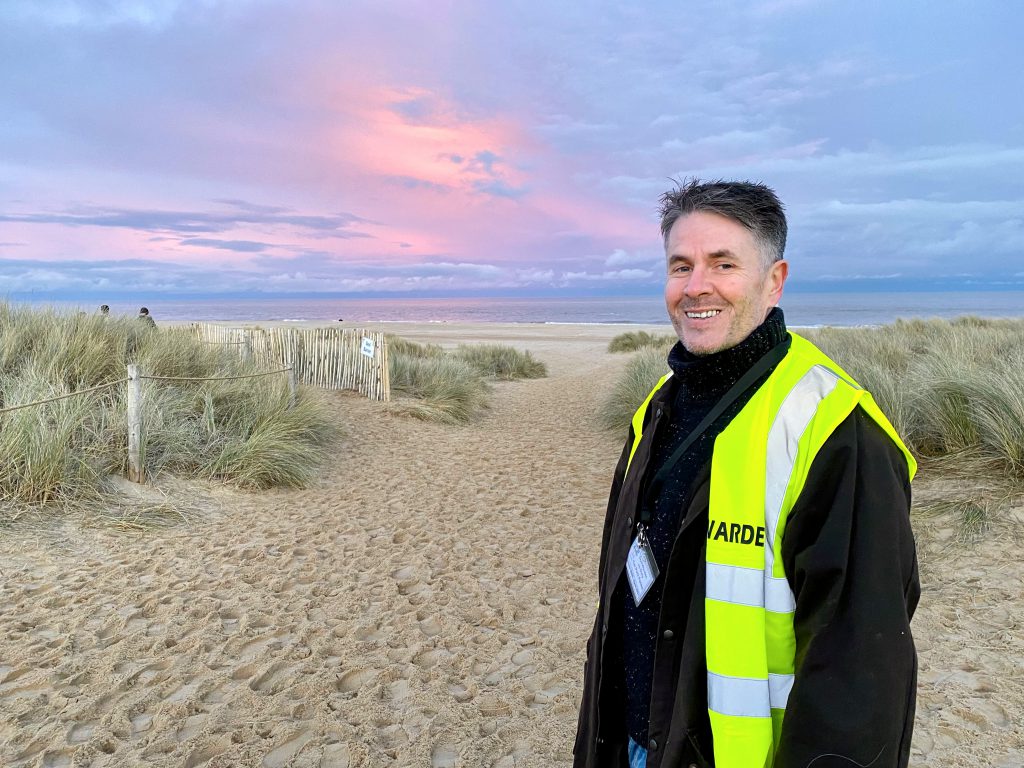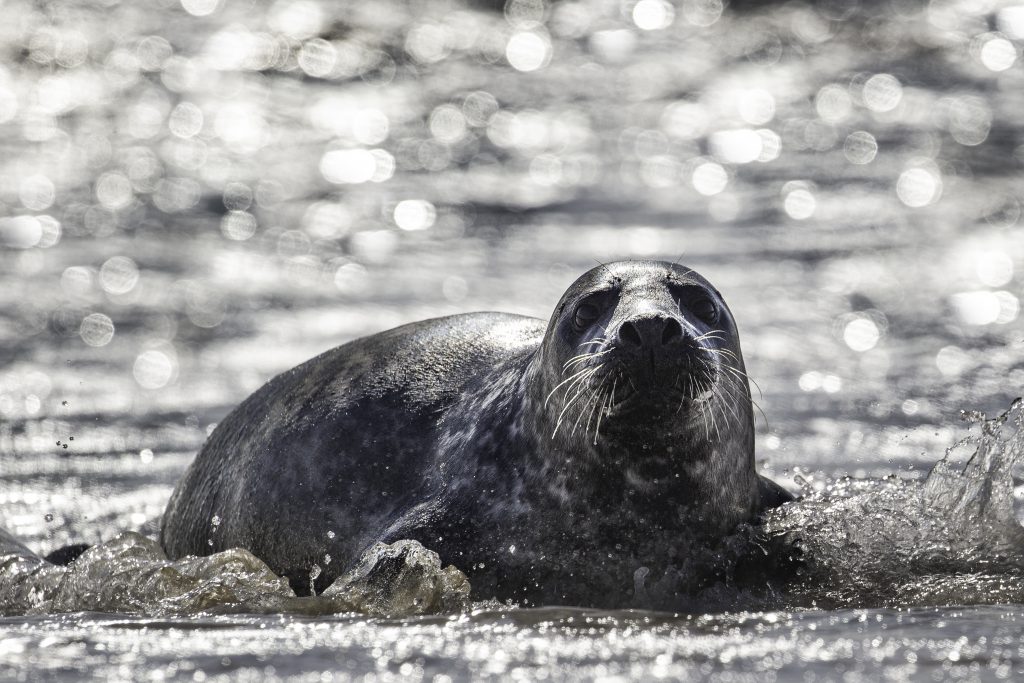Horsey and Winterton beaches are a popular destination all year round. The dunes at Horsey are designated as Sites of Special Scientific Interest (SSSIs) and connect with the Winterton Dunes National Nature Reserve. Both offer a great opportunity throughout the year to see seals. There is a very poor mobile phone signal in some parts of the dunes.

Guidelines For Visiting
When viewing Grey Seals please follow these simple guidelines and protect yourself, the seals and the dunes. Our volunteer wardens are there to help and guide you and to answer your questions about the seals.
- Please don’t walk on the beach at all during the 12-week breeding season, November to January.
- Keep to the paths and roped-off viewing areas to keep you and the seals safe and to avoid unnecessary erosion on the dunes.
- Be advised by our Seal wardens about the best viewing points to see the seals.
- Seals are wild animals and will bite to protect their young so give them their space.
- Be warned. A territorial seal can run faster than you over a short distance, especially downhill.
- Please keep a distance of more than 10 metres away from any seal. (that is the length of a large bus)
- Never get too close or walk between a cow and pup. Seals are likely to desert their pups if you disturb them, leaving them to starve to death.
- Adult seals are strong and heavy animals, please never provoke them.
- Never attempt to stroke a pup or feed a seal.
- Take warm and waterproof clothing. The weather can be changeable, and it can be bitterly cold on the East coast.
- Wear appropriate comfortable footwear, you may end up walking quite a distance.
- Keep dogs on leads at all times. A threatened seal will attack a dog.
- Please always clean up after your dog.
- Don’t leave litter around and dispose of any rubbish responsibly.
Important points: Seal bites can lead to serious infection in both humans and dogs. If bitten, seek immediate medical or veterinarian treatment.
Please never attempt to take selfies close up to a seal.
If you come across a seal that is injured or in distress, please call our emergency Seal rescue number 07706 314514 or the RSPCA on 0300 1234999
Horsey
Horsey Gap grid Reference – TG464242
Horsey is a quiet village of around 100 residents. Miles of golden sandy beach nearby has made it a popular family holiday destination in the summer. The ever-growing seal colony has become a winter tourist attraction as well, especially from November to the January, when the seals give birth. In recent years well over 100,000 visitors have headed for Horsey during the breeding season.
If you come across a FoHS seal warden on your visit, identifiable by their yellow hi-vis vests, they are there to help you get the most out of the experience.

Horsey Beach
As the beach starts to fill up with pregnant seals in late October/early November, a voluntary beach closure is put in place by FoHS wardens. You can still access two great viewing areas on the top of the dunes from Horsey Gap car park.
The paths are roped off and clearly marked, so you will be able to see the seals without disturbing them. These paths are moved periodically to allow regeneration of worn areas of the dunes. Our friendly Wardens are on duty at weekends and every day during term-time and throughout the Christmas school holidays. This site is on private land so please do not spoil its beauty by leaving litter.
Car Park
The car park at Horsey Gap is owned and operated by the Horsey Estate. There are pay and display machines on site which will accept cards and cash. Food and beverages are available a short distance away at the Poppylands Cafe by the turn off onto the Horsey Gap car park access road. Overnight parking, motorhomes, camping and barbecues are not permitted.
There is alternative parking at the National Trust site at Horsey Windpump (just over a mile away) It is also pay-and-display but free to NT members. There is a small giftshop and café (check NT website for opening times).
Toilet Facilities
There are no public toilets on the Horsey Gap car park site. The nearest toilet is for customers at Poppylands Tearooms and a little further away at the Nelson Head Public House. There is a toilet block open to the public at Horsey Windpump which is managed by the National Trust just over a mile away (NT) Check out winter opening days on their website.
Access
Please be aware if you plan to visit Horsey to see the pups over winter, the surface of the coastal track leading to the viewing areas is uneven and often with large puddles. This can make it challenging for people with mobility issues and visitors with pushchairs. The viewing areas are reached by steep and sandy paths up the dunes or steps and because of the soft sand and the uneven slopes, regrettably it makes wheelchair access very difficult. For people with limited mobility, it may be possible to see the seals with assistance.
Weather
Coastal weather can change rapidly so it is important that you wear the right protective clothing and footwear. When planning your visit check the weather forecast before you leave.
Winterton
Winterton Beach Grid Reference – TG498197
Winterton on Sea is an unspoilt seaside village to the south of Horsey and has always been a popular summer beach destination. Since the seal colony has spread southwards, it is now busy with visitors throughout the year. Winterton dunes, a designated national nature reserve, is a haven for birdwatchers and wildlife.
Sadly, the popular Dunes Café, which served generations of holiday makers, has had to be demolished because erosion caused the building to become unstable after winter storms and tidal surges. With more pups being born on Winterton beach each winter, it can become very busy, so expect traffic queues.

Winterton Beach
Winterton beach offers miles of sandy beach and sand dunes. It provides a wonderful area for wildlife. In summer endangered little terns fly in and lay their beautifully camouflaged eggs on the beach. They are protected by RSPB volunteer wardens who cordon the area off to allow the terns to incubate their eggs undisturbed. Also watch out for flocks of snow buntings in the winter.
There is a now a chestnut paling fence, funded by Natural England, which creates a viewing corridor for visitors. This barrier effectively keeps people on one side and seals on the shore side, affording them an easy escape route to the sea if they need it.
The Dunes
The dunes are a vital barrier against inland flooding in stormy weather. They are very important to the safety of the whole area and provide habitats for rare and unusual plants and wildlife. Please stay on the existing paths to minimise wear and tear on the dunes.
Car Park
The Beach Car Park at Winterton is privately owned and is situated on the top of the dunes, above the beach. The payment of parking fees is by cash only. Please be aware the car park closes promptly at 4pm and is then locked. Please don’t park on the verge of the road leading to the car park. It causes obstructions and impedes access for emergency services. Caravans, motorhomes, coaches and motorbikes are not allowed on the Winterton car park.
Toilet Facilities
There is a public toilet block opposite the Winterton car park entrance and customer toilets are also available in the Fisherman’s Return public house in the village.
Access
Because the Car park is in an elevated position, wheelchair user may be able to see the seals from there, especially with a pair of binoculars, but they may find it very difficult to access the beach and other viewing areas because of the steep terrain and deep sand. Those with limited mobility may be able to get closer to the seals with assistance. The deep sand can also be a challenge for parents with pushchairs.
Weather
Coastal weather can change suddenly so it is important that you wear the right protective clothing and footwear. When planning your visit, we suggest you check the weather forecast before you leave home.


